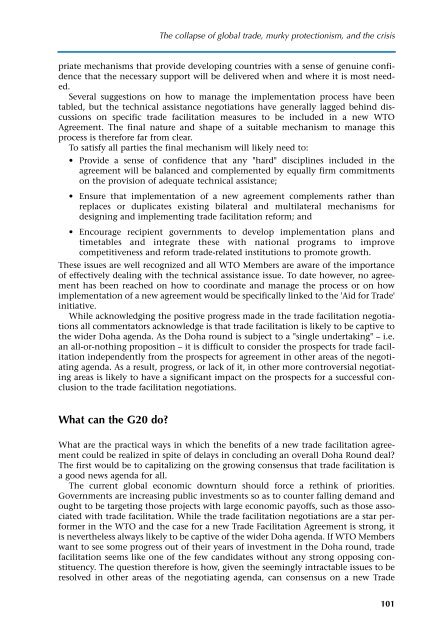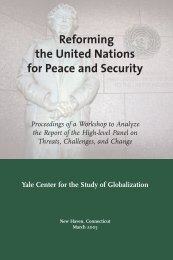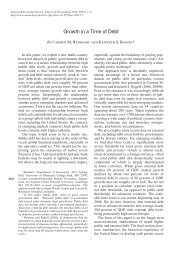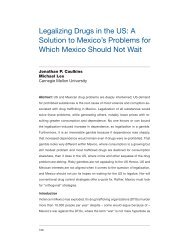The collapse of global trade, murky protectionism, and the crisis:
The collapse of global trade, murky protectionism, and the crisis:
The collapse of global trade, murky protectionism, and the crisis:
Create successful ePaper yourself
Turn your PDF publications into a flip-book with our unique Google optimized e-Paper software.
<strong>The</strong> <strong>collapse</strong> <strong>of</strong> <strong>global</strong> <strong>trade</strong>, <strong>murky</strong> <strong>protectionism</strong>, <strong>and</strong> <strong>the</strong> <strong>crisis</strong><br />
priate mechanisms that provide developing countries with a sense <strong>of</strong> genuine confidence<br />
that <strong>the</strong> necessary support will be delivered when <strong>and</strong> where it is most needed.<br />
Several suggestions on how to manage <strong>the</strong> implementation process have been<br />
tabled, but <strong>the</strong> technical assistance negotiations have generally lagged behind discussions<br />
on specific <strong>trade</strong> facilitation measures to be included in a new WTO<br />
Agreement. <strong>The</strong> final nature <strong>and</strong> shape <strong>of</strong> a suitable mechanism to manage this<br />
process is <strong>the</strong>refore far from clear.<br />
To satisfy all parties <strong>the</strong> final mechanism will likely need to:<br />
• Provide a sense <strong>of</strong> confidence that any "hard" disciplines included in <strong>the</strong><br />
agreement will be balanced <strong>and</strong> complemented by equally firm commitments<br />
on <strong>the</strong> provision <strong>of</strong> adequate technical assistance;<br />
• Ensure that implementation <strong>of</strong> a new agreement complements ra<strong>the</strong>r than<br />
replaces or duplicates existing bilateral <strong>and</strong> multilateral mechanisms for<br />
designing <strong>and</strong> implementing <strong>trade</strong> facilitation reform; <strong>and</strong><br />
• Encourage recipient governments to develop implementation plans <strong>and</strong><br />
timetables <strong>and</strong> integrate <strong>the</strong>se with national programs to improve<br />
competitiveness <strong>and</strong> reform <strong>trade</strong>-related institutions to promote growth.<br />
<strong>The</strong>se issues are well recognized <strong>and</strong> all WTO Members are aware <strong>of</strong> <strong>the</strong> importance<br />
<strong>of</strong> effectively dealing with <strong>the</strong> technical assistance issue. To date however, no agreement<br />
has been reached on how to coordinate <strong>and</strong> manage <strong>the</strong> process or on how<br />
implementation <strong>of</strong> a new agreement would be specifically linked to <strong>the</strong> 'Aid for Trade'<br />
initiative.<br />
While acknowledging <strong>the</strong> positive progress made in <strong>the</strong> <strong>trade</strong> facilitation negotiations<br />
all commentators acknowledge is that <strong>trade</strong> facilitation is likely to be captive to<br />
<strong>the</strong> wider Doha agenda. As <strong>the</strong> Doha round is subject to a "single undertaking" – i.e.<br />
an all-or-nothing proposition – it is difficult to consider <strong>the</strong> prospects for <strong>trade</strong> facilitation<br />
independently from <strong>the</strong> prospects for agreement in o<strong>the</strong>r areas <strong>of</strong> <strong>the</strong> negotiating<br />
agenda. As a result, progress, or lack <strong>of</strong> it, in o<strong>the</strong>r more controversial negotiating<br />
areas is likely to have a significant impact on <strong>the</strong> prospects for a successful conclusion<br />
to <strong>the</strong> <strong>trade</strong> facilitation negotiations.<br />
What can <strong>the</strong> G20 do?<br />
What are <strong>the</strong> practical ways in which <strong>the</strong> benefits <strong>of</strong> a new <strong>trade</strong> facilitation agreement<br />
could be realized in spite <strong>of</strong> delays in concluding an overall Doha Round deal?<br />
<strong>The</strong> first would be to capitalizing on <strong>the</strong> growing consensus that <strong>trade</strong> facilitation is<br />
a good news agenda for all.<br />
<strong>The</strong> current <strong>global</strong> economic downturn should force a rethink <strong>of</strong> priorities.<br />
Governments are increasing public investments so as to counter falling dem<strong>and</strong> <strong>and</strong><br />
ought to be targeting those projects with large economic pay<strong>of</strong>fs, such as those associated<br />
with <strong>trade</strong> facilitation. While <strong>the</strong> <strong>trade</strong> facilitation negotiations are a star performer<br />
in <strong>the</strong> WTO <strong>and</strong> <strong>the</strong> case for a new Trade Facilitation Agreement is strong, it<br />
is never<strong>the</strong>less always likely to be captive <strong>of</strong> <strong>the</strong> wider Doha agenda. If WTO Members<br />
want to see some progress out <strong>of</strong> <strong>the</strong>ir years <strong>of</strong> investment in <strong>the</strong> Doha round, <strong>trade</strong><br />
facilitation seems like one <strong>of</strong> <strong>the</strong> few c<strong>and</strong>idates without any strong opposing constituency.<br />
<strong>The</strong> question <strong>the</strong>refore is how, given <strong>the</strong> seemingly intractable issues to be<br />
resolved in o<strong>the</strong>r areas <strong>of</strong> <strong>the</strong> negotiating agenda, can consensus on a new Trade<br />
101





